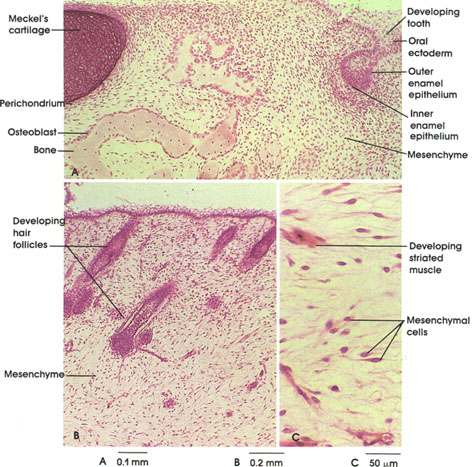

Fetal pig
Ronald A. Bergman, Ph.D., Adel K. Afifi, M.D., Paul M. Heidger,
Jr., Ph.D.
Peer Review Status: Externally Peer Reviewed

Pig, 10% formalin, H. & E., A. 88 x; B. 55 x; C. 220 x.
Mesenchymal connective tissue has a delicate spongy consistency and is composed of cells and a viscous matrix or ground substance containing few fibers.
Mesenchymal cells are characterized by oval elongate nuclei with prominent nucleoli and a mix of hetero- and euchromatin. These cells have little cytoplasm but many thin processes that appear to extend from the nucleus. Mesenchymal cells can differentiate into most of the adult connective tissue cell types, including: (1) fibroblasts, (2) chondroblasts, (3) osteoblasts, (4) odontoblasts, (5) reticular cells, and (6) adipocytes.
The matrix is composed of two classes of compounds: glycosaminoglycans and structural glycoproteins.
In this plate, note several of the mature cell types that have differentiated from mesenchymal cells. Examine the developing tooth in A (also those in Plates 183, 184, 185) and the developing hair follicles in B.
Meckel, 1781 -1833, was a German comparative anatomist and embryologist.
Next Page | Previous Page | Section Top | Title Page
Please send us comments by filling out our Comment Form.
All contents copyright © 1995-2025 the Author(s) and Michael P. D'Alessandro, M.D. All rights reserved.
"Anatomy Atlases", the Anatomy Atlases logo, and "A digital library of anatomy information" are all Trademarks of Michael P. D'Alessandro, M.D.
Anatomy Atlases is funded in whole by Michael P. D'Alessandro, M.D. Advertising is not accepted.
Your personal information remains confidential and is not sold, leased, or given to any third party be they reliable or not.
The information contained in Anatomy Atlases is not a substitute for the medical care and advice of your physician. There may be variations in treatment that your physician may recommend based on individual facts and circumstances.
URL: http://www.anatomyatlases.org/